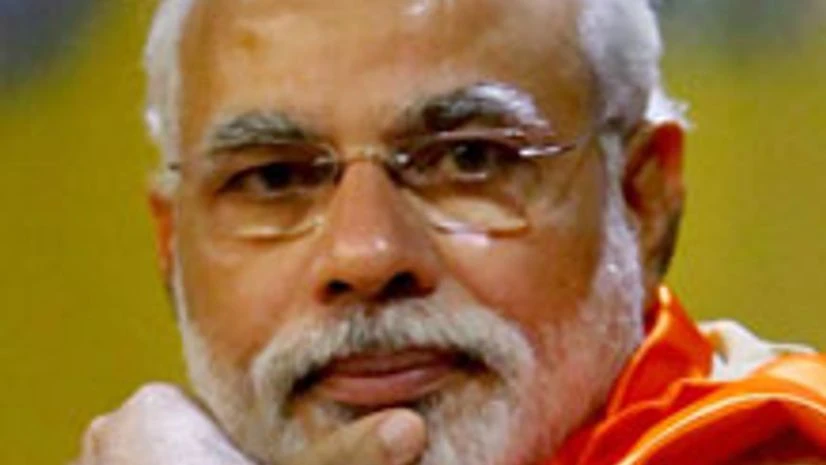Narendra Modi's elevation as the BJP's prime ministerial candidate has energised the party cadre and given them scent of victory in the 2014 general elections. Analysts, however, say that the path ahead is rife with challenges for the Gujarat chief minister due to limitations of the party's geographic spread and the preference of a good number of Indians for a leader with a moderate and inclusive image.
Senior journalist and commentator S. Nihal Singh said Modi's elevation was no surprise, especially after he got blessings of Rashtriya Swayamsevak Sangh (RSS), the BJP's ideological fountainhead.
"I doubt if he can win the polls (for the BJP). I doubt he will have acceptability in the whole country," Nihal Singh told IANS. In a country like India, with its vast ethnic diversity, people have backed "an inclusive leader", he added.
"How is he going to transform himself into another Modi? He can change the narrative...The problem will be credibility," Nihal Singh maintained.
He said decision to elevate Modi may also have been guided by thinking among BJP leaders that the party would not get a large chunk of Muslim votes this time around.
However, Nihal Singh noted that Modi had appeal among sections of urban youth, who see him as a decisive leader.
More From This Section
Subrata Mukherjee, a political analyst who taught at Delhi University, said Modi was still a polarising figure and does not have wide political acceptability.
"In a liberal democracy and in normal circumstances, extremist forces cannot win. Democracy inevitably leads to moderation, except in rare situations," Mukherjee told IANS.
He said the BJP should have at least waited till the assembly polls in five states before taking a decision on Modi's elevation.
The BJP, he said, was weak in several states of the northeast apart from Tamil Nadu, Andhra Pradesh and Kerala. He said the party was not a major force in West Bengal and Odisha and was running third in the politically crucial state of Uttar Pradesh.
Aswini K. Ray, a former professor of political science at Jawaharlal Nehru University, said Modi's critics have raised his profile through constant pillorying.
"His critics have made him a hero," Ray said.
He said Modi had an image of being focused, uncorrupt and target-oriented.
"I think the BJP's decision to make him its prime ministerial candidate is justified. He has it in him. He has come up from the ranks. He has the political skills," Ray told IANS.
Surveys have shown Modi leading the race for the post of prime minister.
An ABP News-Nieslen survey said more than 60 percent of respondents had rated Modi's performance as "good/ very good" and that he was leading the race for prime minister followed by Congress vice president Rahul Gandhi and incumbent Manmohan Singh.
A CNN-IBN opinion poll said that Modiwas the most preferred leader across the political parties to become the next prime minister.
G.V.L. Narsimha Rao, a member of the BJP's national electoral reforms committee, said Modi's appeal transcends the party's traditional support base.
He said the party was expecting around 230 seats with Modi as its prime ministerial candidate.
Narasimha Rao said the party had got its highest vote share of 25.6 percent in the 1998 elections and 18.80 percent in 2009.
"We expect to get 30 percent votes for the first time (in the next general election)," he added.
Narasimha Rao said apart from Modi's appeal, the party will be substantially helped by "anti-incumbency against the United progressive Alliance (UPA) government and its lack of leadership".
He said the BJP will start attracting new allies over the next few months as political parties will feel pressure from their own supporters in favour of Modi.
Mridula Mukherjee of Jawaharlal Nehru University's history department said the BJP would find it difficult to get allies with Modi at the helm of the campaign.
"In my opinion, it is not a very good decision. The BJP lost the JD-U (Janata Dal-United) as a big ally on this issue, Mukherjee told IANS.
She said it will be wrong to assume that the people have forgotten the 2002 Gujarat riots or the letter by arrested and suspended police officer D.G. Vanzara in which he alleged that Modi and former Gujarat minister of state for home Amit Shah were also to blame for staged shootouts in the state.
"Modi may get support from some sections but will push away those who are not in favour of Hindutva being on the agenda," Mukherjee maintained.
She said it was too early to talk of the outcome of the Lok Sabha polls and there is a possibility that the impact of welfare measures like the rural employment guaranatee scheme and the food security bill was being underestimated.
Rizwan Qaiser, associate proferssor in Jamia Millia Islamia's history department, said that Modi was not a unanimous choice within the BJP as the prime ministerial candidate.
He said people would want to know "if a prime ministerial candidate is above board legally and politically".

)
